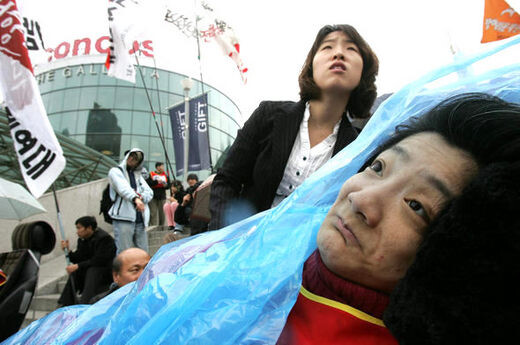hankyoreh
Links to other country sites 다른 나라 사이트 링크
5 years after suicide of disabled rights activist, much work remains

She was born to a poor family living near a U.S. military camp in Paju, Gyeonggi Provice. Uneducated and physically handicapped, Choi Ok-ran had to rely on state subsidies for survival.
Choi, who staged a one-person protest at the Myeongdong Cathedral five years ago that was chronicled by the Hankyoreh, demanded better government support for the physically challenged. But she gave up hope after the government made no response to her efforts. She swallowed an overdose of sleeping pills at her rented apartment and did not wake up. She was 36 years old.
On March 26, disabled people from across the nation gathered at Seoul Station to mark the fifth anniversary of Choi’s death, but they are still doubtful over how much has been changed since her sacrifice in terms of helping them lead their daily lives.
Choi, after going through a divorce, had to peddle cheap merchandise on the street in order to raise her son. Under regulations at that time, anyone earning over 330,000 won (US$320) a month was not eligible for government assistance; Choi’s monthly earnings exceeded this limit. Since she had to spend hundreds of thousands of won every month to cover her medical bills, Choi has no choice but to give up work in order to get government assistance for her medical payments. She was thus left with no money to raise her son beside what small subsidy the government then provided her.
Things have not improved much over the past five years, except that the monthly earnings cap was raised to a little more than 400,000 won. "Such one- or two-member disabled households such as Choi’s are still having difficulty overcoming absolute poverty," said Jwa Hye-gyung, a policy advisor for the Democratic Labor Party.
Choi, wheelchair-bound, could not get around on her own without great difficulty. Starting this June, the government will introduce measures to help such people be more mobile by providing assistants for up to 180 hours a month upon payment of 21,000-42,000 won for that duration. But observers say the measure is not enough. "There should be no time limit" for the available help, said Park Gyeong-seok, an official at a civic group seeking no discrimination against the disabled.
One small consolation is that Choi’s death has brought more attention to the welfare of the physically challenged, leading to such measures as the introduction of lower-set buses for ease of ingress and egress, and the provision of government-subsidized low-income rental apartments for the indigent disabled.
However, there are still many measures left to be done, activists say. Moon Sang-min, another official of the civic group, referring to the recently-opened Incheon International Airport train service, said, "Many disabled cannot reach the ticket vending machine at the stations, and there is too large a gap between the platform and the car." "Many public facilities still do not provide the physically challenged with easy access and the disabled are still discriminated against," he added.
Please direct questions or comments to [englishhani@hani.co.kr]
Editorial・opinion
![[Column] Season 2 of special prosecutor probe may be coming to Korea soon [Column] Season 2 of special prosecutor probe may be coming to Korea soon](https://flexible.img.hani.co.kr/flexible/normal/500/300/imgdb/original/2024/0426/3317141030699447.jpg) [Column] Season 2 of special prosecutor probe may be coming to Korea soon
[Column] Season 2 of special prosecutor probe may be coming to Korea soon![[Column] Park Geun-hye déjà vu in Yoon Suk-yeol [Column] Park Geun-hye déjà vu in Yoon Suk-yeol](https://flexible.img.hani.co.kr/flexible/normal/500/300/imgdb/original/2024/0424/651713945113788.jpg) [Column] Park Geun-hye déjà vu in Yoon Suk-yeol
[Column] Park Geun-hye déjà vu in Yoon Suk-yeol- [Editorial] New weight of N. Korea’s nuclear threats makes dialogue all the more urgent
- [Guest essay] The real reason Korea’s new right wants to dub Rhee a founding father
- [Column] ‘Choson’: Is it time we start referring to N. Korea in its own terms?
- [Editorial] Japan’s rewriting of history with Korea has gone too far
- [Column] The president’s questionable capacity for dialogue
- [Column] Are chaebol firms just pizza pies for families to divvy up as they please?
- [Column] Has Korea, too, crossed the Rubicon on China?
- [Correspondent’s column] In Japan’s alliance with US, echoes of its past alliances with UK
Most viewed articles
- 1[Column] Season 2 of special prosecutor probe may be coming to Korea soon
- 2‘We must say no’: Seoul defense chief on Korean, USFK involvement in hypothetical Taiwan crisis
- 3No good, very bad game for Korea puts it out of Olympics for first time since 1988
- 4Is Japan about to snatch control of Line messenger from Korea’s Naver?
- 5Division commander ordered troops to enter raging flood waters before Marine died, survivor says
- 6Is N. Korea threatening to test nukes in response to possible new US-led sanctions body?
- 7Korea’s 1.3% growth in Q1 signals ‘textbook’ return to growth, says government
- 8N. Korean delegation’s trip to Iran shows how Pyongyang is leveraging ties with Moscow
- 9[Editorial] Korea’s surprise Q1 growth requires objective assessment, not blind fanfare
- 10Amnesty notes ‘erosion’ of freedom of expression in Korea in annual human rights report